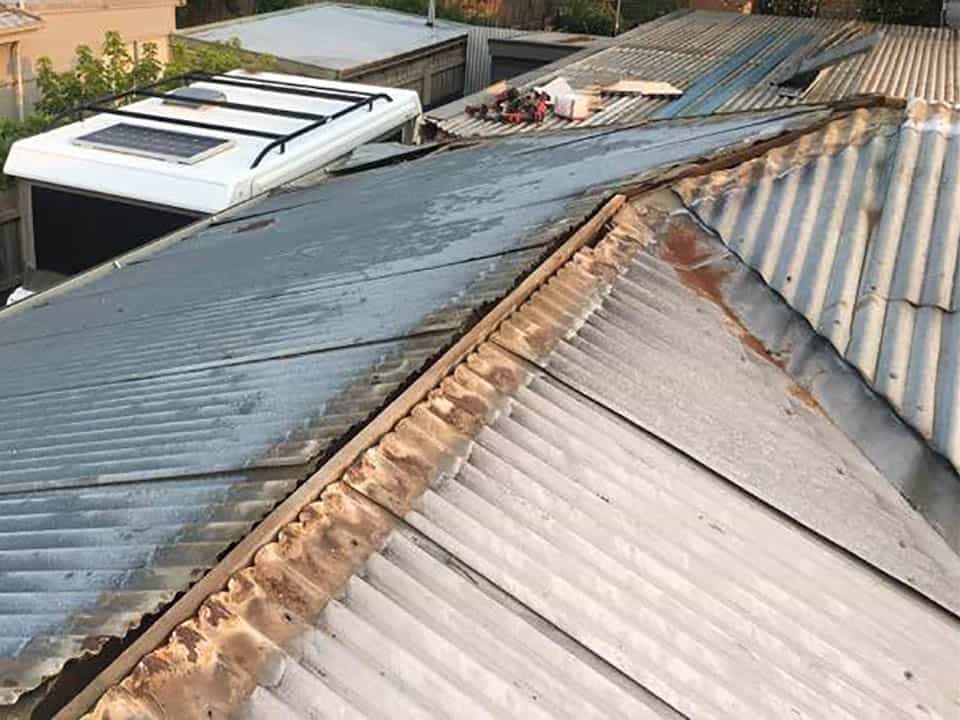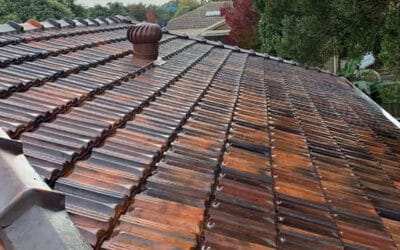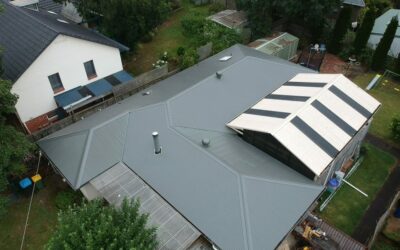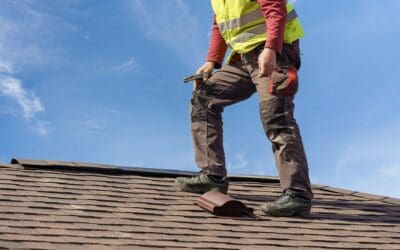There’s an unwelcome drip in your home, a telltale sign of a roof leak. It’s a nuisance that can lead to sleepless nights and costly damages if ignored. Unfortunately, repairing it yourself may not always be the solution, especially if it’s beyond a simple patch-up job. You need the right hands for the task – a professional contractor. But how do you choose the best from a sea of competent handymen? This blog post demystifies the process of hiring a proficient contractor for your roof leak repair, ensuring you get quality workmanship that secures your home – and peace of mind – even in the wildest weather conditions.
Repairing a roof leak involves identifying the source of the leak and taking appropriate action. Start by inspecting the roof uphill for any stains or signs of water damage to locate the potential entry point. Common sources of leaks are roof penetrations like plumbing vents or damaged flashing. If you are comfortable doing so, you can attempt to fix these issues yourself using techniques such as replacing vent boots or applying new caulk. However, it is always recommended to hire a professional roofer for larger or more complex repairs to ensure the job is done properly and to avoid any safety risks.
Identifying Roof Leak Problems
Roof leaks are major inconveniences to any homeowner, and identifying the problem can be quite tricky. Leaks can originate from various sources that may not directly correlate with the point at which water penetrates the ceiling. Attic insulation, electrical wiring, and HVAC units can all contribute to leak damage without any visible watermarks.
Identifying Roof Leak Problems
Roof leaks are major inconveniences to any homeowner, and identifying the problem can be quite tricky. Leaks can originate from various sources that may not directly correlate with the point at which water penetrates the ceiling. Attic insulation, electrical wiring, and HVAC units can all contribute to leak damage without any visible watermarks.
Identifying Roof Leak Problems
Roof leak repair are major inconveniences to any homeowner, and identifying the problem can be quite tricky. Leaks can originate from various sources that may not directly correlate with the point at which water penetrates the ceiling. Attic insulation, electrical wiring, and HVAC units can all contribute to leak damage without any visible watermarks.
Interior Causes of Leaks
Sometimes a leaking roof isn’t the problem itself but a symptom of deeper-rooted issues such as inadequate ventilation. Here are some common interior causes of roof leaks:
-
Inadequate Ventilation
– Without efficient ventilation, heat and moisture collect in attics leading to wood and metal corrosion. Attic insulation is also affected by moisture, compressing it over time, thus reducing its effectiveness. The air conditioning system is negatively impacted too as it draws in warmer air from the attic. For example, suppose your bathroom doesn’t have an exhaust fan or poorly installed ceiling/light fixtures leading to vapours seeping up into the attic causing mould and mildew growth on rafters or darker spots along the roof sheathing consistency with moisture saturation.
-
Condensation
– During colder weather, indoor humidity condenses on cool surfaces like metal pipes creating puddles that cause structural problems if left unaddressed. If you notice dripping water around pipes or window sills during winter/cold months, condensation could be the issue.
-
Damage to Roof Penetrations
– Plumbing vents, chimneys, skylights–any area where something goes through your roof must be appropriately sealed. In case of leakage near roof penetrations like plumbing vent boots or cracked chimney flashing means checking for cracks in plastic bases or broken seams in metal bases. Replacing them with new vent boots or rubber-washer screws usually does the trick.
-
Ice Dams
– In cold climates, ice dams can form on the roof as snow melts and refreezes at colder points. This buildup prevents water from flowing to roof edges for proper drainage, instead causing it to seep through shingles. If you notice icicles hanging from gutters and eaves during winter, call a professional to inspect the roof for ice dams.
Remember, identifying and fixing leaks early is vital to avoid more significant problems down the line. A qualified roofer is invaluable in this process as they bring experience and tools to pinpoint and repair hard-to-spot leaks quickly.
Finding the Leak’s Exterior Origin
When you notice water stains or leaks on your ceiling, your priority should be to identify the leak’s exterior origin. This process may require some patience and attention to detail, but it’s crucial to finding a permanent solution. Keep in mind that water can travel along different paths before finding its way into your home. Therefore, pinpointing the precise location of the exterior leak is critical.
Start by examining the areas uphill from any visible interior water stains. Inspect roof penetrations like plumbing and roof vents, chimneys, and dormers for any damages that could potentially allow water into your attic or crawl space.
For instance, if you notice a water stain or damage on your bathroom ceiling beneath a vent pipe, look for flaws in the flashing around the base or any cracks in the vent itself. Similarly, investigate whether there are any cracks near plumbing vents and check for missing shingles or deteriorating sealant around skylights.
Next up in our search for solutions are Expert Remedies for Common Roof Leaks.
- According to the National Roofing Contractors Association, almost 70% of all roof repairs are due to leaks.
- A study from the Insurance Information Institute reported that over 40% of homeowners have experienced loss due to water damage, including roof leaks.
- The U.S. Bureau of Labour Statistics reports that demand for skilled roofers is expected to grow by 11% from 2020 to 2030, largely driven by the need for leak repairs and replacement of aged roofs.
Expert Remedies for Common Roof Leaks
Once you’ve located the source of your roof leak, remedying it involves matching the solution to the specific cause of the problem.
In some cases, repairing roof leaks doesn’t call for an entire replacement of your roofing material; instead, patchwork may get the job done. Here are some tips:
| Water Damage Cause | Repair Solution |
|---|---|
| Broken Shingles | Remove damaged shingle pieces and replace with new ones secured with adhesive. |
| Loose Flashing | Replace with new metal flashing. |
| Damaged Plywood | Replace with new plywood. |
| Caulk/Sealant Wear and Tear | Scrub old caulk out with a scraper or knife. Apply a fresh coat of caulk/sealant around gaps and seams. |
It’s vital to detect the root cause of your leaky roof and determine whether the damage calls for a simple fix or a complete renovation. While addressing these problems may seem overwhelming, they can turn out manageable with professional assistance.
Call In The Experts For Your Roof Repairs
If you don’t have the necessary skills or time to conduct a thorough analysis of your roofing system, call in the experts who can leverage their knowledge and experience to identify the issue’s underlying cause – and recommend appropriate fixes.
Think of it like consulting a doctor for your health. Just as a doctor conducts tests to diagnose ailments before administering treatment, expert roofing contractors are trained to assess roof leaks and identify precisely what it will take to make it right.
- When dealing with a roof leak, it’s important to accurately identify the source of the problem in order to apply the appropriate solution. Instead of immediately replacing the entire roofing material, patchwork may be sufficient in some cases. Here are some specific tips for common causes of roof leaks:- Broken Shingles: Remove damaged shingles and replace them with new ones securely attached with adhesive.- Loose Flashing: Replace the old flashing with new metal flashing.- Damaged Plywood: Replace any damaged plywood with new plywood.
– Caulk/Sealant Wear and Tear: Use a scraper or knife to remove old caulk, then apply a fresh coat of caulk or sealant around gaps and seams.
It is crucial to determine whether your leaky roof requires a simple fix or a more extensive renovation.
- If you lack the skills or time for a thorough analysis, it’s advisable to seek professional assistance. Roofing contractors have the knowledge and experience to identify the underlying cause of the issue and recommend suitable fixes. Just like consulting a doctor for medical ailments, relying on experts can lead to accurate diagnoses and effective solutions for your roof leaks.
Preparations before Tile Roof Repair
Tile roofs are known for their durability and aesthetic appeal. However, they can also face damages from various sources, including falling debris or heavy winds. To ensure a successful tile roof repair, preparations need to take place before any intervention. It’s best to evaluate the extent of the damage beforehand to determine if the problem can be solved using DIY methods or professional help is necessary. Most tile roof repairs require specific materials that match the existing ones and specialised tools like pry bars, plastic roofing cement, and roofing nails.
Minor Roof Leak Repair
For minor repairs, identify the damaged tiles and scrub them thoroughly before filling and sealing any voids using plastic roofing cement or fibre cement adequately. This process can also involve replacing individual tiles by removing damaged ones with appropriate safety gear and tools.
Once you’ve assessed the damage’s severity, it’s time to focus on selecting the right materials for your surfaces.
- Tile roof repairs require careful preparation, evaluation of damage, and the use of specialised tools and materials. Minor repairs can usually be done through cleaning, filling, sealing, or replacing individual tiles. It is important to assess the severity of the damage before proceeding with the repair process.
Professional Patchwork
One common mistake when repairing roof leaks is merely applying some caulking around an area with obvious water infiltration. Although this approach may provide a semblance of a fix, it’s unlikely to be sustainable or even fix the underlying problem.
Consider this: A leaking skylight might seem like an easy fix by merely caulking around its edge. However, this will only seal out water temporarily as the adhesive properties typically diminish over time due to exposure to UV rays from the sun and other environmental factors.
To execute efficient roof repairs, experts recommend finding out where the leak originates and addressing any missing shingles or damaged flashings before sealing with proper materials. But what does proper sealing entail?
Hiring a Roof Repair Contractor
Whether you’ve noticed some water stains on your ceiling or drips in your living room, finding the right contractor to fix the issue can be stressful. A leaking roof, if not addressed promptly, can cause extensive damage to your home and even pose safety hazards. Finding a reputable, skilled, and reliable contractor for a roof leak repair should always be prioritised. However, this decision should not be made hastily as it could result in unsatisfactory workmanship or worse – additional damage.
Assessing Contractor Credentials
Understanding how to assess the credentials of roofing contractors is paramount when selecting someone to repair your roof. The following are some essential factors that must be considered in assessing contractor credentials:
Firstly, ensure the contractor has a valid licence and certifications related to roofing repairs. Such documents indicate that the individual has passed tests demonstrating their capability to perform high-quality and safe work.
Secondly, check reviews from previous customers who have had contract work done by the same company or individual. Testimonials from former clients are an excellent way of knowing what level of workmanship and professionalism is expected during each project. Word-of-mouth referrals from people within your social network are also helpful.
Thirdly, verify the insurance status of the contractor so you cannot be held liable for any accidents resulting from working on your property. Liability coverage must be explicitly verified before proceeding with any repair projects.
Fourthly, investigate how long the contractor has been in business and clarify whether they specialise in specific types of roof repair. Credible contractors such as locally owned roofer companies that have been in operation for several years usually have a higher level of experience and are better equipped to advise you on viable solutions.
Lastly, consider seeking upfront estimates from multiple contractors before making a hiring decision based solely on price. It’s worth noting that cheaper isn’t always better when it comes to contracting services; it’s often better to invest in a reputable contractor that offers an all-inclusive service package, including warranties and post-project customer care.
Here is an example: “ABC Roofing Company was established in 1995 by John Doe, a roofer with over 30 years of industry experience. They are licenced and insured with liability coverage of up to $2 million. Their website has testimonials from previous clients who praise their level of workmanship and efficiency. The company specialises in repairing asphalt shingle roofs, which matches the type of roofing material on my house.”
Think of assessing contractor credentials like conducting a job interview – you want to be certain the applicant has all the relevant qualifications and possesses the requisite expertise for the position.
Understanding the Cost of Professional Roof Leak Repair
Roof leak repair is an essential aspect of maintaining your property’s structural integrity and preventing water damage. It can also enhance curb appeal, protect your investment, and save you future expensive repairs. However, it is not uncommon for homeowners to put off necessary roof repairs due to uncertainty about costs.
The total cost of roof repair depends on the specific issue and your roof type, with the national average cost ranging between $400 and $2,000. Some factors influence these costs, such as the type of repair needed (minor, moderate, or major), materials used (tar and gravel, rubber or PVC, composite shingle, asphalt shingle, slate, metal, wooden shakes or shingles, tile), roof pitch/ design, labour cost, time of year, location, inspection and permits, and size of the roof.
For instance, a small leak stemming from loose flashing around a vent or chimney may only require minor repair work that could cost less than $200. In contrast to this, spotting a large hole in the middle of your roof would involve extensive repair work that will cost much more. Similarly, low-slope roofs can be challenging to repair compared to steep-sloped roofs since they require additional safety precautions and equipment.
Roof Leak Repair Cost
Think about it like going in for surgery – The more complicated the procedure is for your surgeon; the higher the cost involved. Similarly with roofing – if there are more complicated repairs needed on your roof, it will cost more.
While some homeowners may consider saving a buck by fixing the leak themselves, this is not advisable. Repairing your roof illegally can lead to future budget-straining repairs or even safety issues. Additionally, structural damage caused by a botched repair can affect the resale value of your property in the long run.
Therefore, it’s crucial to hire a professional contractor for any roof leak repair work due to the complex nature of the job and possible legal ramifications. A licensed contractor with extensive experience and knowledge can provide expert repair services that meet local and state codes, ensuring you avoid additional expenses in the future.
Get in touch with us today for a free quote.




